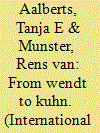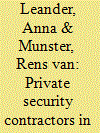| Srl | Item |
| 1 |
ID:
083580


|
|
|
|
|
| Publication |
2008.
|
| Summary/Abstract |
Constructivism is often identified as the legitimate occupant of the middle ground between rationalism and reflectivism that emerged from the Third Debate in international relations (IR) theory. Indeed, the rationalist-constructivist debate is already being framed as the next dominant debate with the IR community. This paper evaluates the bridge-building project as initiated by Alexander Wendt, and takes issue with the via media as proposed by the so-called conventional constructivists. It is claimed that the rationalist-constructivist debate has been limited to a discussion of ontology, which has brought about a contradiction between ontology and epistemology. Returning to the pressing epistemological issues that were put on the table by reflectivist scholars, this article refocuses the current debate by taking up the Kuhnian link between substance and science. It elaborates a view of science as a communal practice built on intersubjective conventions and argumentative procedures. This leads to an alternative conception of the middle ground as a communicative space.
|
|
|
|
|
|
|
|
|
|
|
|
|
|
|
|
| 2 |
ID:
077390


|
|
|
|
|
| Publication |
2007.
|
| Summary/Abstract |
This article explores the loud presence of private security contractors in the evolving and buoyant discussion surrounding Darfur. Relying primarily on statements by security contractors and industry lobby organizations, this article suggests that neo-liberal governmentality has bolstered the expert status of security contractors in the discussions surrounding Darfur. Both in Darfur and more widely, neo-liberal governmentality tends to `depoliticize' security as public debate narrowly focuses on the technicalities and costs of military solutions, while alternative political options, local knowledge and diplomatic alternatives become marginalized. Consequently, public debate may be intense (as is certainly true for Darfur) but lopsidedly centred on security restrictively understood. The depoliticizing trend tied to neo-liberal governmentality is an important change in security governance in Darfur of course, but also in Africa more broadly and beyond. However, since it works through what the editors of this issue refer to as the `complex relations between public and private, state and civil society actors' it tends to eschew analyses assuming that privatization is significant only when and if it undermines public authority and control. The account here testifies to the importance of changes in governance that involve public and private actors alike
|
|
|
|
|
|
|
|
|
|
|
|
|
|
|
|